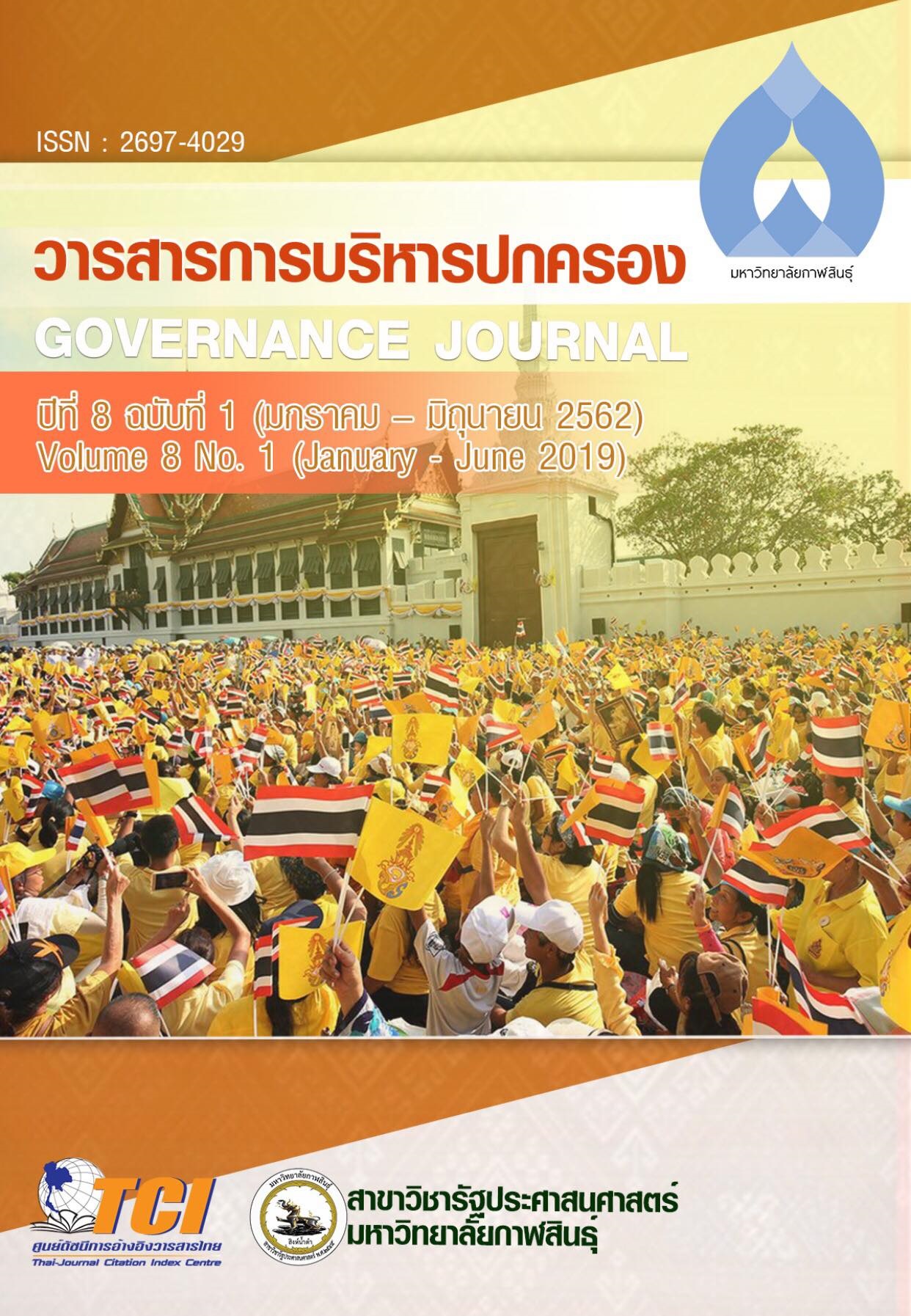การพัฒนากรอบแนวคิดปฏิสัมพันธ์เชิงอำนาจกับ กระบวนการวางแผนแบบรวมพลัง
DOI:
https://doi.org/10.14456/gjl.2019.15คำสำคัญ:
การวางแผนแบบรวมพลัง, โครงสร้าง, ปฏิสัมพันธ์เชิงอำนาจบทคัดย่อ
บทคัดย่อ
การวิจัยนี้เป็นการวิจัยเชิงคุณภาพ (Qualitative Research) มีวัตถุประสงค์เพื่อศึกษาความหมายและความสำคัญของการวางแผนแบบรวมพลัง (Collaborative Planning) ภายใต้การปฏิสัมพันธ์ระหว่างโครงสร้าง (Structure) และผู้กระทำการ (Agency) และผลที่เกิดขึ้นในรูปของการปฏิสัมพันธ์เชิงอำนาจที่มาจากกระบวนการวางแผนแบบรวมพลัง โดยทบทวนวรรณกรรม ผลการศึกษาพบว่า การวางแผนแบบรวมพลัง เป็นการวางแผนพัฒนาเมืองในรูปแบบหนึ่งที่ทำให้เกิดการร่วมมือกันพัฒนาเมืองของทุกฝ่าย โดยเฉพาะภาคประชาชนที่เข้ามามีส่วนร่วมในการพัฒนาเมืองกับภาครัฐ จึงก่อให้เกิดการปฏิสัมพันธ์ระหว่างโครงสร้างภาครัฐ และผู้กระทำการ ที่อยู่ในภาคของประชาชนเป็นสำคัญ การกระทำร่วมกันในลักษณะดังกล่าวจึงทำให้เกิดปฏิสัมพันธ์เชิงอำนาจระหว่างสองขั้วความสัมพันธ์ที่ร่วมกันวางแผนพัฒนาเมือง โดยผู้กระทำการสามารถเปลี่ยนแปลงโครงสร้าง เพื่อการพัฒนาเมืองในรูปแบบใหม่ ปฏิสัมพันธ์เชิงอำนาจที่เกิดขึ้น แสดงให้เห็นว่าทุกฝ่ายที่เข้ามาร่วมในกระบวนการดังกล่าว ต้องการช่วงชิงอำนาจเพื่อการได้มาซึ่งผลประโยชน์ส่วนตัวมากที่สุด ดั้งนั้นกระบวนการและบทบาทของนักวางแผนพัฒนาเมืองจึงเป็นสิ่งสำคัญ ที่จะทำให้เกิดผลประโยชน์ที่ลงตัวของทุกฝ่าย ซึ่งการวางแผนแบบรวมพลังจะสามารถลดทอนและกระจายอำนาจที่เกิดขึ้นไปยังทุกฝ่ายที่มีส่วนเกี่ยวข้องในกระบวนการวางแผนพัฒนาเมือง โดยเฉพาะในระดับชุมชนและนโยบายที่เกิดขึ้นมาจากความต้องการของประชาชน
Downloads
เอกสารอ้างอิง
กาญจนา แก้วเทพ. (2547). ทฤษฎีและแนวทางการศึกษาสื่อสารมวลชน.
กรุงเทพฯ : แบรนด์เอจ.
กาญจนา แก้วเทพและสมสุข หินวิมาน. (2551). สายธารแห่งนักคิดทฤษฎี
เศรษฐศาสตร์และการเมือง. กรุงเทพฯ : สำนักพิมพ์แห่งจุฬาลงกรณ์
มหาวิทยาลัย.
เจมส์ กอร์ดอน ฟินเลย์สัน. (2559).ฮาเบอร์มาส มนุษย์กับพื้นที่สาธารณะ. แปลจาก
Habermas A very Short Introduction. แปลโดย วรารัก เฉลิมพันธุศักดิ์:
กรุงเทพฯ: สวนเงินมีมา
เชษฐา พวงหัตถ์. (2548). โครงสร้าง-ผู้กระทำการ. กรุงเทพฯ: สำนักงาน
คณะกรรมการวิจัยแห่งชาติ.
ณัฐวุฒิ อัศวโกวิทวงศ์. (2009). ปฏิสัมพันธ์ของการวางแผน-บทเรียนจากการศึกษา
เปรียบเทียบในการปฏิบัติการจากล่างสู่บน. Journal of Architectural/Planning Research and Studies 6, (2).
รัตนา โตสกุล. (2548). มโนทัศน์เรื่องอำนาจ (The concept of power). กรุงเทพฯ:
สำนักงานคณะกรรมการวิจัยแห่งชาติ.
สมศักดิ์ สามัคคีธรรม. (2551). ‘ความสมเหตุสมผล/อำนาจ และสภาวะสมัยใหม่:
หนทางสู่หายนะของมนุษยชาติแห่งศตวรรษที่ 21’. วารสารร่มพฤกษ์ 26 (1).
สำนักงานราชบัณฑิตยสภา.(2560). Collaborative Planning : การวางแผนแบบ
รวมพลัง. [ออนไลน์]. เข้าถึงเมื่อวันที่ 28 กุมภาพันธ์ 2560, จาก ripub@royin.mail.go.th
Campbell, S. and Susan S. Fainstein. (1996). The Structure and Debates of
Planning Theory. Readings in Planning Theory. Cambridge, MA: Blackwell.
Cedar, A. J. M. (2009). Evaluating Collaborative planning : A case study
of the Morice land and Resourse management. School of Resource and Environmental Management. SIMON FRASER UNIVERSITY
Forester, J. F.. (1989). Planning in the Face of Power. The Berkeley
Planning Journal
Foucault, M. (1982). Disclipline and Punish: The Birth or Prison.
Harmundsworth : Penguin Books Ltd..
Giddens, A. (1971). Capitalism and Modern Social Theory. Cambridge:
Cambridge University Press.
Habermas, J. (1979). Communication and the Evolution of Society
(T. McCarthy,Trans.). Canada: Beacon Press. (Original work
published 1976).
Harper, T. L. & Stein, S. M. (2006). Dialogical planning in a fragmented
society. New Brunswick, NJ: Center for Urban Policy Research
Harris, N. (2002). ‘Collaborative planning: from theoretical foundations
to practice forms, Planning Futures: New Directions for
Planning Theory. London: Routledge
Healey, P. (1997). Collaborative Planning: Shaping Places in
Fragmented Societies. University of Columbia: Canada.
Healey, P. (1998). ‘Building Institutional Capacity through Collaborative
Approaches to Urban Planning’. Environment and Planning.
Innes, J. E. (2004). Consensus building: Clarifications for the critics.
Planning Theory, 3(1), 5-20.
Margerum, D. R. (2002). Collaborative Planning Building Consensus and
Building a Distinct Model for Practice. Journal of Planning Education and Research.
McGee, G. J. A. (2006). Evaluating collaborative planning: A case study of
the north coast land and resource management plan. MRM
Report 399. Burnaby, BC:Simon Fraser University, School of
Resource and Environmental Management.
Olson, N, S. & Khalid Yahia, S. (2006). Structuration Theory : Giddens
Explored Structuration Theory : Giddens Explored. 2006, pp.1–15. Available at: http://socgeo.ruhosting.nl/html/files/geoapp/Werkstukken/Giddens.pdf.
Susskind, L., Wansem, M.W., & Ciccarelli, A. (2003). Mediating land use
disputes: Proandcon. Environments. 31(2), 39-58.
Taylor, N. (1998). Urban Planning Theory since 1945. London: Sage.
Yagüe, O. L. & Christian, B. (2012). PLANNING THEORY IN
POSTMODERNITY. Adolfo Cazorla & James Midgley, PLANNING
AND COMMUNITY DEVELOPMENT:CASE STUDIESUC Berkeley – Technical University of Madrid. Madrid (Spain): Grupo GESPLAN-UPM.
Translated Thai References
Finlayson, J. G. (2016). Habermas: A man of public space. Translate from
Habermas: A very Short Introduction. Translate by Wararak Chalearmpansak: Bangkok. Suangein mi ma.
Kaewteap, K. (2004). Theories and Guidelines for Mass Communication
Studies. Bangkok: Brandage
Kaewteap K. and Somsuk, H. (2008).The flow of thinkers, economic
and political theorists. Bangkok: Chulalongkorn University Press.
Office of the Royal Society. (2017). Collaborative Planning [Online].
Retrieved February 28, 2017, from ripub@royin.mail.go.th
Puanghut, C. (2005). Structure-agency. Bangkok:
National Research Council.
Samukkhethum, S. (2007). Reasonableness / power And modernism: the
path to disaster Mankind of the 21st Century’, Rom Phruek Journal. 26 (2).
Tosakul, R. (2005). The concept of power. Bangkok:
National Research Council.
Usavagovitwong, N. (2009). Planning Interaction – Lessons from a
Comparative Study of Bottom-up Approach in Practice. Journal of Architectural/Planning Research and Studies. Volume 6. Issue 2. 2009. Thammasat university.
ดาวน์โหลด
เผยแพร่แล้ว
รูปแบบการอ้างอิง
ฉบับ
ประเภทบทความ
สัญญาอนุญาต

อนุญาตภายใต้เงื่อนไข Creative Commons Attribution-NonCommercial-NoDerivatives 4.0 International License.








